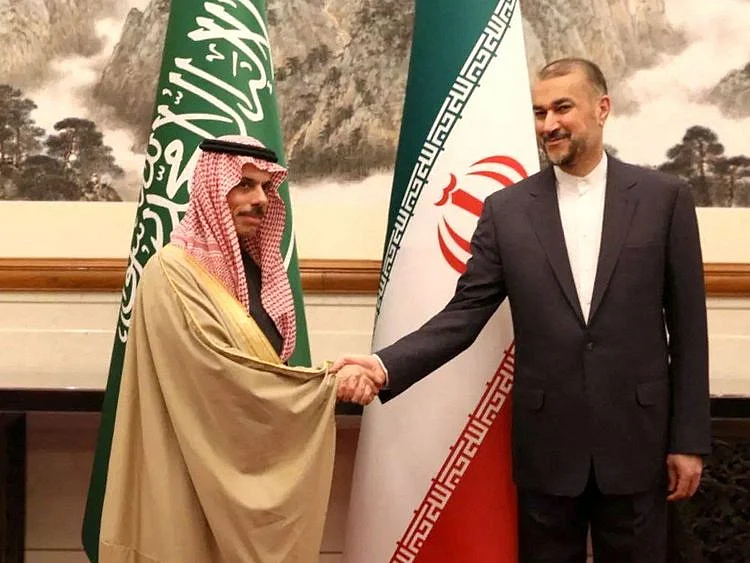China's soft power in the Middle East is a game changer
Beijing’s non-interference policy and transparent agenda is winning hearts and minds

China is coming strong into the Middle East, not on the back of aircraft carriers but is opening doors using its proven soft power as an economic powerhouse.
The engagement with the region has been taking place for some time. But now Beijing is taking strong steps to solidify new alliances based on non-interference, a transparent agenda and preserving mutual interest. And yes this is a game changer for the region.
Earlier this month China’s Foreign Minister Qin Gang said that his country supports countries in the Middle East in upholding their strategic independence, getting rid of external “interference”, and keeping the region’s future in their own hands.
Also Read
China, Russia, Iran hold joint naval drills in Gulf of OmanChina’s Xi wants bigger global role after Saudi-Iran dealIran-Saudi Arabia deal boosts hopes for more cooperation with Arab neighboursChina’s Xi speaks with Saudi crown prince, supports Saudi-Iran talksLast month a Chinese brokered deal between Saudi Arabia and Iran has been hailed as a significant diplomatic breakthrough which was also unexpected.
Riyadh and Tehran are adopting confidence building measures as they prepare to exchange ambassadors and normalise ties. The benefit for the region cannot be ignored. The rapprochement is expected to reflect on a number of regional conflicts, chief among them the crisis in Yemen.
A major trading partner
China is a major trading partner of both countries. Its economy, the second largest in the world, is dependent on energy supplies from the region. In 2021 China signed a 25-year agreement with Iran while last December President Xi Jinping paid a historic visit to Riyadh, which included a China-GCC summit, opening a new chapter in relations at a critical time for both sides.
What is important to note is that it is not only China that has adopted a new approach to the region, but major regional countries are now recalibrating their strategy to move closer to China. Areas of cooperation are boundless; from technology and AI to space exploration and energy, and from research and development to aligning policies towards global issues. Security and defence are also a key part of the developing relationship. What we see taking place here is a true partnership.
Last year Saudi Arabia made one of its largest investments in China with Aramco’s $10 billion infusion into a refinery and petrochemical complex in China’s northeast. Last week Saudi Arabia announced that it was set to join the Shanghai Cooperation Organization (SCO) as a ‘dialogue partner’. The SCO is the world’s biggest regional political, economic and defence organisation both in terms of geographic scope and population.
For China the Middle East is an important hub in its Belt and Road long-term strategic initiative under which the region as well as China stands to benefit. The fact that China is now projecting its soft power to help countries in the region resolve conflicts is an indicator that Beijing is being viewed as an impartial party and thus as an honest broker.
But what does this evolving partnership say about the waning US influence in the region? Regional leaders have made it clear that they are now pursuing policies that put their countries’ key interests as top priority.
While still considering the US as an ally, these countries now see a shift towards a multipolar world that necessitates non-interference in the internal affairs of others while avoiding taking sides in major conflicts. China is calling for a rational and just world order to replace the current one.
Resolving conflicts peacefully
China has been supportive of any effort aimed at resolving conflicts peacefully and has demonstrated its understanding of Arab common causes through its voting record in the UN Security Council.
The US chaotic withdrawal from Afghanistan in 2021 and the war in Ukraine have contributed to adopting a new regional approach to global crises. China has no colonial legacy in the region. Its soft power paradigm opens the way for economic cooperation that promises to bolster regional economies while promoting peace and conflict resolution.
What the new partnerships mean for the future of the region in a multipolar world can only be imagined. It will take time for these new partnerships to take shape.
The US remains top military regional partner, but China’s approach promises other areas of cooperation in a stable and peaceful Middle East. For the countries of the region such promise is both beneficial and constructive.
Osama Al Sharif is a journalist and political commentator based in Amman.
Sign up for the Daily Briefing
Get the latest news and updates straight to your inbox
Network Links
GN StoreDownload our app
© Al Nisr Publishing LLC 2025. All rights reserved.